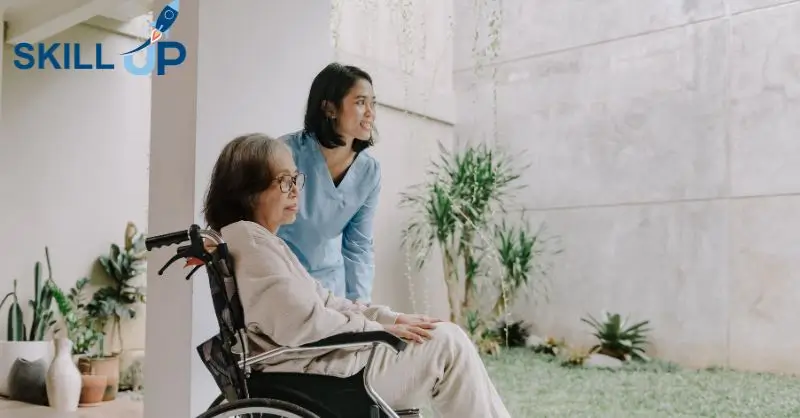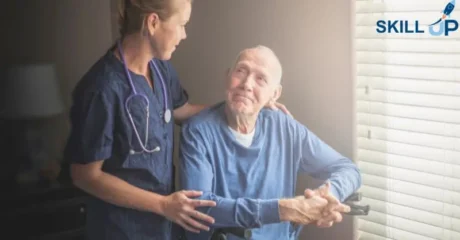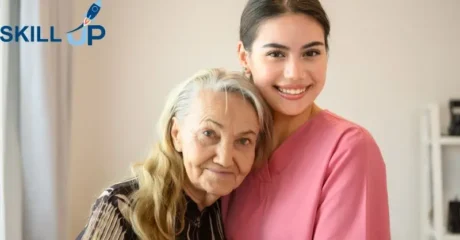 Course Highlights
Course Highlights
The Care Certificate UK is an agreed set of standards for new or inexperienced workers in their health and social care jobs. The 15 standards of the care certificate ensure all support workers and care assistants follow the same high standards of care. This Diploma in Care Certificate (Standards 1 to 15) course will provide you with the knowledge and skills to meet the 15 care certificate standards and enter a promising career in health and social care.
This Care Certificate Standards course will improve your knowledge of the 15 standards of the care certificate and the code of conduct standards to provide safe and effective care. It will familiarise you with the multiple aspects of care, from understanding your role as a caregiver to safeguarding vulnerable children and adults and promoting equality and diversity.
Furthermore, our care certificate training will enrich your knowledge of mental health awareness, dementia, and basic life support. Again, you’ll understand what legislation relates to recording, storing and sharing information in care settings. Lastly, you’ll identify how an infection enters the body and learn the procedures, equipment and personal protective clothing for infection prevention and control. Sign up today!
Disclaimer: This Diploma in Care Certificate (Standards 1 to 15) course will give you a detailed understanding of the duties and responsibilities of a caregiver and the 15 standards of Care Certificate UK you must adhere to at work. However, the course doesn’t provide care certificates or official qualifications for professional practice. Instead, this 15 standards of care certificate training will prepare you for the care certification and open doors for various health and social care jobs.
 Learning outcome
Learning outcome
- – Determine what is care certificate and the code of conduct standards
- – Understand what are the 15 standards for the care certificate
- - Realise what duty of care you have to those receiving care and support
- - Identify what legislation is used for moving and assisting
- - Learn the best practices in safeguarding adults and children
- - Strengthen your ability to maintain health and safety standards
- - Learn how to handle confidential information securely
 Who is this 15 Standards of Care Certificate Training For?
Who is this 15 Standards of Care Certificate Training For?
This course is for those interested in developing their knowledge of the 15 standards of care certificate to provide high quality care. In addition, those already working in health and social care or new care workers can take this course to learn about the care certificate and code of conduct standards at a deeper level. Our care certificate courses will prepare you for achieving your care certification as well as improve your opportunities for rewarding health and social care jobs UK.
 Certificate of Achievement
Certificate of Achievement
Skill Up Recognised Certificate
Upon successfully completing this course, you can request a Skill Up Recognised Certificate. This certificate holds significant value, and its validation will endure throughout your lifetime.
1. PDF Certificate + PDF Transcript: £14.99
2. Hard Copy Certificate + Hard Copy Transcript: £19.99
3. Delivery Charge: £10.00 (Applicable for International Students)
 Course Duration
Course Duration
This 15 Standards of Care Certificate Training takes 20 hours and 7 minutes to complete. However, you’ll get 1-year access to the course materials. Again, the duration for course completion will vary depending on your learning speed and engagement with the course materials.
 Career path
Career path
The Diploma in Care Certificate (Standards 1 to 15) course opens opportunities for many exciting Clinical coding jobs UK, as well as remote medical coding jobs UK. Related professions in this industry include:
- - Support Worker
- - Palliative Care Assistant
- - Dementia Care Worker
- - Nursing Assistant
- - Learning Disabilities Support Worker
- - Clinical Support Worker
 Benefits You Will Have from This Care Certificate Course(Key Features)
Benefits You Will Have from This Care Certificate Course(Key Features)
- - Get 1-year access to the course materials
- - All-inclusive cost with no hidden fees
- - Achieve an internationally acknowledged CPD certification.
- - Learn at your own pace, from anywhere and anytime
- - Learn in-demand skills from industry experts
- - Affordable and interactive e-learning study materials
- - Access course materials from any digital device, including tablet, PC or smartphone
- - Get exceptional customer service and administrative support through email, phone, and chat.
 Why Should I Take This Diploma in Care Certificate Course(Standards 1 to 15)?
Why Should I Take This Diploma in Care Certificate Course(Standards 1 to 15)?
- - Deepen your understanding of the care certificate and code of conduct standards
- - Identify the duties and responsibilities of a caregiver
- - Learn how to develop awareness of mental health conditions, dementia, and learning disabilities
- - Learn how to manage nutritional and hydration needs of those under your care
- - Understand what legislation is used for moving and assisting patients
- - Gain an excellent understanding of infection prevention and control
 FAQ: Diploma in Care Certificate Course(Standards 1 to 15)
FAQ: Diploma in Care Certificate Course(Standards 1 to 15)
Why do you need a care certificate?
The Care Certificate serves as foundational training for individuals starting a career in health and social care. It ensures they meet the 15 standards of the Care Certificate required for safe and effective care.
What are the 15 standards for the care certificate?
The 15 standards of the Care Certificate are:
– Understanding Your Role
– Personal Development
– Duty of Care
– Equality and Diversity
– Work in a Person-Centred Way
– Communication
– Privacy and Dignity
– Fluids and Nutrition
– Awareness of Mental Health, Dementia, and Learning Disabilities
– Safeguarding Adults
– Safeguarding Children
– Basic Life Support
– Health and Safety
– Handling Information
– Infection Prevention and Control
Can you work in care without a care certificate?
You can start working in a care role without a certificate. However, most employers require you to complete the care certificate as part of your induction training. It’s mandatory for those new to care roles in regulated settings. Our care certificate course will provide the roadmap to achieving your care certification.
What is a care certificate equivalent to?
The care certificate UK is equivalent to an entry-level qualification in health and social care. It’s not a formal academic qualification but demonstrates foundational knowledge and skills.
What are the care certificate and the code of conduct standards?
The Care Certificate UK is a set of 15 standards outlining the essential skills and knowledge needed to provide safe and compassionate care. The Code of Conduct Standards are guidelines that set out the professional behaviours and attitudes expected from care workers.
What do the care certificate and code of conduct standards include?
The Care Certificates include:
– 15 care certificate standards covering duty of care, safeguarding, infection prevention, communication, and person-centred care.
– Practical and theoretical training to ensure workers deliver safe, compassionate, and high-quality care.
– A focus on equality, privacy, dignity, and health and safety practices
The care certificate code of conduct standards include:
– Professional behaviour guidelines for care workers, such as maintaining confidentiality and acting with integrity.
– Promoting respect, independence, and rights of individuals.
– Adhering to safe working practices and ensuring accountability in care delivery.
Course Curriculum
-
The Duties and Responsibilities of a Care Worker
00:22:00
-
Employment Rights and Responsibilities
00:21:00
-
Aims, objectives and values of the service
00:12:00
-
Responsibilities to the Individuals
00:22:00
-
Different Working Relationships in Care Settings
00:09:00
-
The Importance of Partnership Working
00:15:00
-
Skills That Healthcare Professionals Need
00:18:00
-
Identify Sources of Support for Own Learning and Development
00:20:00
-
What Is Duty of Care
00:35:00
-
Dilemmas That may Arise Between the Duty of Care and an Individual’s Rights
00:25:00
-
Procedures for Responding to Complaints
00:35:00
-
Recognising Adverse Events, Incidents, Errors and Near Misses
00:20:00
-
Factors and Difficult Situations That may Cause Confrontation
00:23:00
-
Understanding Diversity
00:12:00
-
Discrimination that can be Deliberately or Unintentional
00:16:00
-
Legislation and codes of practice relating to equality
00:12:00
-
Respecting individuals’ beliefs, culture, values and preferences
00:09:00
-
Sources of Information for Diversity, Equality, and Inclusion
00:12:00
-
Putting Person-Centred Values into Practice
00:12:00
-
The Importance of Finding out the History, Preferences, Wishes and Needs
00:17:00
-
Environmental Factors that may cause Discomfort or Distress
00:08:00
-
Raising concerns directly with the individual concerned
00:10:00
-
Caregiving is more than just monitoring medicines and driving to doctor
00:16:00
-
Ensuring the comfort of individuals where they have restricted movement
00:15:00
-
Promoting person centred values
00:06:00
-
Recognising the signs of pain or discomfort
00:09:00
-
Different Ways that People Communicate
00:24:00
-
Why it is important to observe and be receptive to an individual
00:07:00
-
Establishing an Individual’s Communication and Language Needs, Wishes ans Preferences
00:09:00
-
Barriers to Effective Communication
00:14:00
-
How to Check whether the Health Care Support Worker and Adult Social Care
00:05:00
-
What Is Confidentiality
00:08:00
-
The Use of Appropriate Verbal and Non-Verbal Communication
00:16:00
-
Communication Aids
00:07:00
-
What is meant by privacy and dignity
00:17:00
-
Maintaining the Privacy of the Individual
00:27:00
-
Ways of Helping Individuals to Make Informed Choices
00:30:00
-
How Valuing People Contributes to Active Participation
00:22:00
-
Supporting the Active Participation of Individuals in Their Care
00:09:00
-
The Importance of Food Safety, including Hygiene, in the Preparation and Handling of Food
00:20:00
-
Ensuring That Drinks Are within Reach of Those That Have Restrictions on Their Movement
00:10:00
-
How someone may feel if they have mental health conditions
00:20:00
-
How Conditions Influence a Person’s Needs in Relation to Care
00:25:00
-
How Positive Attitudes towards those with mental health conditions
00:18:00
-
Adjustments which may be Necessary in Care Delivery
00:29:00
-
Importance of Early Detection of Mental Health Needs, Dementia or Learning Disability
00:14:00
-
Requirements of Legislation and Policies
00:28:00
-
Effect of listed legislation and policies
00:11:00
-
Capacity
00:20:00
-
Safeguarding adults
00:10:00
-
Types of Abuse
00:18:00
-
Defining “Harm”
00:11:00
-
Indicators of Abuse
00:13:00
-
Factors Which have Featured in Adult Abuse and Neglect
00:17:00
-
How Care Environments can Promote and Undermine People’s Dignity and Rights
00:14:00
-
Reducing the Likelihood of Abuse with Risk Enablement and Management
00:10:00
-
Appropriate Actions to take When Abuse is Suspected
00:15:00
-
Legislation, Local and National Policies and Procedures Related to Safeguarding Adults
00:12:00
-
The Importance of Sharing Information with the Relevant Agencies
00:13:00
-
Safeguarding Children at Level 1
00:09:00
-
Actions to Take If a Child, Young Person (Met in Any Circumstances) Is Suspected to Be Abused
00:09:00
-
Basic Life Support (BLS)
00:19:00
-
Legislation Relating to General Health and Safety in a Health or Social Care Work Setting
00:12:00
-
Health and Safety Policies and Procedures
00:16:00
-
How to Access Additional Support and Information Relating to Health and Safety
00:12:00
-
The Importance of Risk Assessment for Health and Safety Standards
00:11:00
-
Legislation Relating to Moving and Assisting
00:13:00
-
Procedures to Follow When Accidents or Illness Occur
00:21:00
-
Protecting Security
00:12:00
-
Identifying Common Signs of Stress in a Work Setting
00:15:00
-
Agreed Ways of Working regarding the Recording, Storing and Sharing of Information
00:25:00
-
Importance to Have Secure Systems for Recording, Storing and Sharing Information
00:17:00
-
How to Keep Records That Are Up to Date, Complete, Accurate and Legible
00:20:00
-
The Main Ways an Infection Can Get into the Body
00:11:00
-
Effective Hand Hygiene
00:11:00
-
Risk to the individuals
00:10:00
-
Common types of personal protective clothing, equipment and procedures
00:10:00
14-Day Money-Back Guarantee
-
Duration:20 hours, 7 minutes
-
Access:1 Year
-
Units:77


Want to get everything for £149
Take Lifetime Pack




